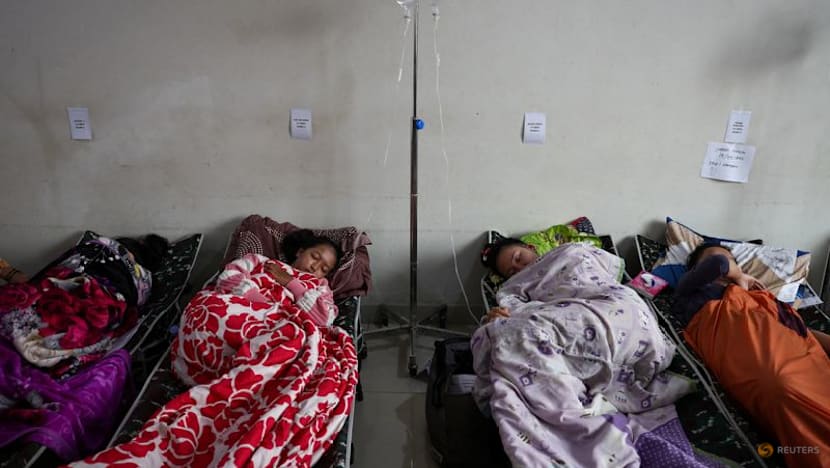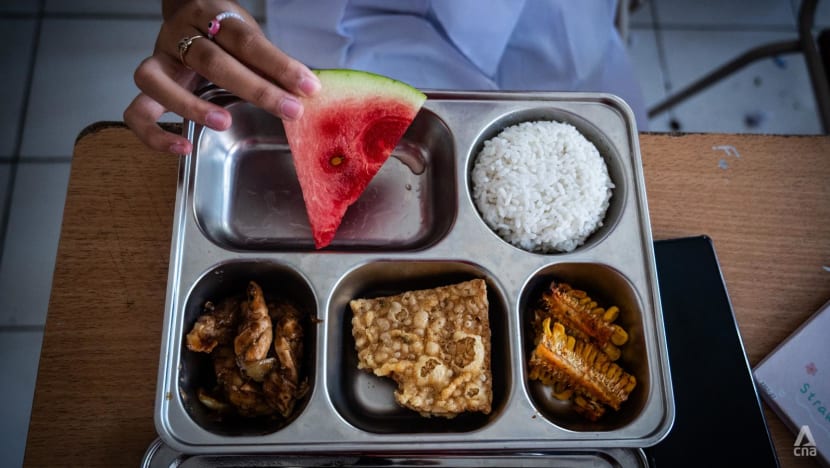Commentary: Indonesia’s free meals programme is a recipe for risk
Grand promises about feeding children have fallen foul of rushed implementation and ignoring lessons from abroad, says an Indonesia analyst.

Students rest while receiving treatment for food poisoning after eating government-sponsored free school meals, at Cililin regional hospital in Bandung, West Java province, Indonesia, Sep 25, 2025. (Photo: Reuters/Willy Kurniawan)
JAKARTA: Indonesia’s Free Nutritious Meal programme carries an irresistible political promise that no child should go hungry at school.
Launched in January by Indonesian President Prabowo Subianto and widely known by the acronym MBG, it aims to provide free meals to tens of millions of schoolchildren, toddlers and pregnant women. The ambition is historic in scale, but its execution has revealed a troubling gap between vision and capacity.
The programme’s budget is colossal. The government set aside 171 trillion rupiah (US$10 billion) in 2025, with plans to nearly double it in 2026. This announcement won international attention, positioning Indonesia as a champion of social welfare.
Yet by the middle of the year, only 3 trillion rupiah had been spent, reaching fewer than 4 million beneficiaries against a target of more than 17 million. The mismatch suggests a programme pushed faster than the system can handle.
FOOD SAFETY LAPSES
Food safety has become its most alarming flaw. By September, almost 6,000 people, including more than a thousand children in West Java, had been hospitalised after consuming MBG meals.
Reports pointed to spoiled ingredients, poor hygiene and untrained kitchen staff. Authorities shut down dozens of kitchens, while police launched probes. But these are not minor errors. They highlight weaknesses in procurement, supervision, and training. For a programme feeding children, the tolerance for mistakes is essentially zero.
Institutional weakness compounds the problem. MBG is overseen by the newly created National Nutrition Agency, yet no presidential regulation had defined its powers or accountability. Transparency International Indonesia has warned of corruption risks, from inflated contracts to collusion in kitchen tenders. The Indonesian ombudsman noted “brokers” exploiting loopholes and failures in enforcing safety standards.
In short, MBG operates with billions in play but without firm legal or administrative scaffolding.

A RECKLESS RUSH
Looking at examples abroad, Indonesia’s rush appears reckless. Japan’s school lunch programme is decentralised, tightly supervised, and supported by dietitians. China focuses subsidies on poor rural districts instead of promising universality. Malaysia, Singapore, and the Philippines restrict free meals to disadvantaged groups or early childhood centres.
These models are targeted, gradual, and anchored by strong oversight. Indonesia, by contrast, has leapt directly into near universal coverage without first building trust or capacity.
Scale alone makes the task daunting. Feeding tens of millions daily across thousands of islands requires logistical precision. Inadequate oversight almost guarantees uneven quality. Weak procurement allows unreliable suppliers. Missing regulations leave accountability gaps.
Worse, MBG funding comes from the education budget, raising concerns that classrooms and teachers will be shortchanged while vast sums flow into kitchens still failing basic safety.
RECALIBRATION IS URGENT
None of this means MBG should be abandoned. But recalibration is urgent. Targeting should be narrowed initially to malnourished regions, rather than promising all children instant access.
Legal clarity must be established through binding regulations. Oversight should include local governments, parents, and independent auditors, while data on spending and food safety incidents must be made public. Expansion must be gradual, with strict kitchen standards and training preceding any increase in coverage.
MBG is a noble idea undermined by premature universalism. In theory, no child hungry at school is a goal worth striving for. But in practice, Indonesia has shown how populism can outrun governance. Instead of becoming a showcase for inclusive development, MBG risks being remembered for food poisoning, wasted trillions, and shaken trust in public institutions.
The programme still has a chance to succeed, but only if Jakarta slows down, builds the rules before expanding, and places quality above coverage. Otherwise, a project meant to nourish a generation may instead stand as a cautionary tale about the dangers of rushing grand promises without the systems to deliver them. In its current form, Indonesia’s free meal ambition looks less like a solution to hunger and more like a recipe for risk.
And if the government refuses to learn from its own failures, then MBG may prove less about feeding children and more about feeding political egos, an experiment in which Indonesia gambled with public trust, and the nation’s youngest citizens were left to pay the price.
Ronny P Sasmita is a senior analyst at Indonesia Strategic and Economics Action Institution. This commentary first appeared on the Lowy Institute’s site, The Interpreter.














